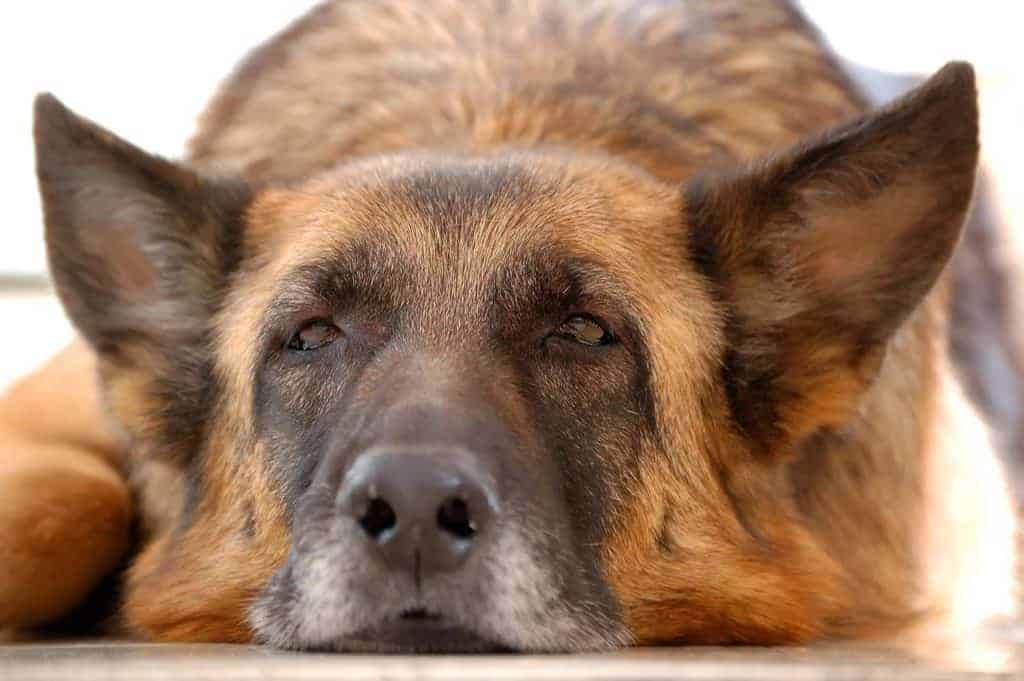
Welcoming a German Shepherd into your family can be an exciting decision to make, but it also comes with a couple of important thoughts and expectations. Some of which would be its lifespan, how you can lengthen it, and how you can make the most out of its life.
How Long Do German Shepherds Live? German Shepherds reach their seniority once they turn 7 years of age, and while most GSDs live as long as a decade, the average lifespan would range from 9-13 years. Many dog owners would consider this a reasonably long life, but if you wish to cherish more time with your buddy, increasing your awareness of what commonly affects a German Shepherd’s longevity may help you stretch out its lifespan.
Common Factors that Affect a German Shepherd’s Lifespan
German Shepherds are generally healthy and active canines, but they do have some drawbacks with their temperament and health that most dog owners should know:
Size and work load matter
This breed is considered a working type of dog; hence, unlike Pugs or Chihuahuas, they exert more physical effort that would cause their bodies to tire sooner. This explains exactly why a well-cared-for GSD is still likely to live less long compared to smaller dogs. Moreover, some common ailments can be detrimental to a German Shepherd’s lifespan, and sadly, many of these issues are hereditary and are caused by improper breeding.
Improper breeding and usual health issues
For instance, hip and elbow dysplasia is a prevalent illness among German Shepherds because of inbreeding. This condition would gradually cause pain and discomfort to your dog since the joints from the hips or elbow’s are incorrectly formed; in this case, it would affect more of your dog’s quality of life as it would eventually disable it.
For large dogs like German Shepherds, they are also prone to developing arthritis and decreased mobility. You might be wondering why this condition is most commonly found in large dogs, and this is simply because big dogs have a greater mass that can put a lot of stress on their joints and cartilages, which progressively leads to severe inflammation and dysfunction.
Unfortunately, arthritis worsens over time and would heavily manifest when your dog reaches its seniority. The severity of both dysplasia and arthritis might not directly cause a German Shepherd’s fatality, but when the pain has become evidently unbearable, most dog owners choose to euthanize their dogs to save them from prolonged suffering.
Cancer as a major problem
German Shepherds’ most commonly diagnosed fatal diseases are hemangiosarcoma (cancer of the spleen) and osteosarcoma (bone cancer). Although the cause of hemangiosarcoma is still unknown, it’s believed to be genetic; the same goes for osteosarcoma, which can also be caused by other environmental factors.
On one hand, hemangiosarcoma is a tumor developed mainly from a dog’s blood vessels that would slowly spread in other parts of its body; the death rate of GSDs who were diagnosed with this disease is extremely high that even if dog owners were opting to have their dogs undergo surgery and chemotherapy, it would only have it survive for an expected maximum of 6-8 months.
On the other hand, osteosarcoma is a condition slightly similar to hemangiosarcoma except that the tumor’s growth would result in bone damage. For German Shepherds, their long bones, such as their arms and legs, are most commonly affected by osteosarcoma and can be treated through amputation, radiation therapy, or chemotherapy, costly. Without any treatments, the average survival time for a GSD would only be for at least 2 months. It’s a sad truth that both of these diseases are predisposed in German Shepherds and can indeed shorten their lifespan.
All in all, all that were aforementioned are some of the most prominent health issues found in German Shepherds. However, other more diseases remain life-threatening to this specific breed. Lastly, it’s best advised that you monitor your dog if you sense that it’s not feeling well; this would lead to an earlier diagnosis that would have you ready in providing it standard care.
Unlimited claims, No credit checks, No upper age limit & Multiple pet discounts
Signs that your German Shepherd’s Life is Ending
It can be difficult for any dog owner to dwell on the thought of losing a beloved friend, but eventually, that day will come, and you need to be prepared. If you’ve spent plenty of time with your dog, you’ll easily notice drastic changes with its behavior, yet some signs can be uncertain. So without further ado, we will be discussing 5 of the most prominent signs that your GSD’s life is ending. Let’s begin.
1 – Quiet and quickly tired
When a German Shepherd reaches its senior years, you’ll notice how they’ll gradually lose their energy and even show disinterest in toys or walks they used to be so excited about. When your dog’s life is nearing the end, you’ll often find it lying around in quiet places that would exclude itself from other pets or people. It won’t also move as much as it would try to limit itself from feeling even more uncomfortably frail than it already is.
2 – Decreased mobility and balance
A loss in mobility and balance means that your dog’s muscles are growing extremely weak upon old age, more so, the absence of its natural fun and outgoing behavior may only imply the nearing end of its life. Soon, you’ll notice that your dog will find it challenging to move from one place to another; it will only feel unsteady on its feet; hence, you’ll find it resting on the ground more often than not.
3 – Loss of appetite and incontinence
When a dog is close to passing away, it tends to lose its appetite; it will eat or drink from almost none to completely nothing and result in a noticeable weight loss. This is because its digestive organs are slowly shutting down as death comes closer; your dog will no longer feel the need to eat nor drink at this time and would rather lie down to get some rest. Besides that, your dog may also lose control over its bladder, so it would typically urinate or defecate wherever it lies.
4 – Complete and prolonged disinterest
Once your dog grows old, it loses its senses and would barely want to interact with anyone. When a German Shepherd is about to face death, it will no longer feel entertained with any toys or treats; never confuse your dog for loving you any less during this time but rather understand that it’s hurting and would seek more of your care and comfort.
5 – Odd breathing
It can be devastating to witness a change in your dog’s breathing; uneven and slow paces of breathing may indicate that your dog is struggling to breathe and may run out of it anytime. When a dog’s breathing becomes shorter and slower, it can be a sign that you need to say goodbye as its life is about to end.
These are all general signs of when a dog is about to pass away, although it’s also possible for an ill dog to experience the same symptoms. If your GSD is still young and exhibits some of these signs, it’s suggested to have them checked at the vet for early diagnosis and treatment.
Whereas, if your dog is in its senior years and shows no hope of getting better, realize that being there for your buddy when it finally faces its end is the most important thing you should do. Pet your dog softly and reassure it that everything will be okay, it may not show any response, but it will appreciate your comfort.
Help Your German Shepherd Live a Long and Happy Life

German Shepherds don’t live as long as humans do, so it’s crucial for every dog owner to be able to grant it years of happy and beautiful memories. For a German Shepherd to live its best life, its health is one of your biggest priorities.
Is There A way to Extend Your German Shepherd’s lifespan?
There are many ways to keep your German Shepherd healthy and extend its life. You can do that by keeping your German Shepherd lean. High quality low carb dog food with 18-22% protein is a good healthy diet.
The study found that dogs of each breed who were normal weight lived longer (and had a lower risk of death). More than 50,000 neutered or spayed adult dogs were studied by Cummings School of Veterinary Medicine in 2019 and published in the Journal of Veterinary Internal Medicine. It found a normal weight dog had an estimated increased lifespan of 6 months to 2 years and 6 months, which is a lot more time to spend with your best friend than an overweight dog.
Diet, vet checks and grooming are a must
You must be mindful of your dog’s dietary needs, grooming requirements, and regular veterinary check-ups. It’s also important that your dog completes its vaccinations from birth until its adolescence; this would include booster shots and annual rabies doses. Furthermore, be wary not to feed your dog with human food that can cause digestion problems such as chocolates and the like. Note that giving your dog treats from the kitchen may not be healthy for it, even though it may seem to like it.
Activity is bliss
It’s a primary requirement that your German Shepherd exercises every day to keep it away from boredom and decrease the possibility of getting overweight or obese. Be reminded that a GSD is bred to work all day, so a walk in the park might not be enough for it to release all its energy. It’s best advised that a German Shepherd is given a big and safe space where it can run or roam freely without a leash.
Freedom means happiness
Lastly, never keep your dog inside a small cage! GSDs love nothing more than having to explore and do something, so it would be cruel to have them restricted in a small area. This will only leave your dog emotionally unstable and will further develop negative and unpleasant behavior.
Conclusion
As they say, caring for a dog is like taking care of a child, and researching how to be responsible will go a long way. If you love your German Shepherd, let it know through spending quality time with it and be there when it needs you most!
Unlimited claims, No credit checks, No upper age limit & Multiple pet discounts
